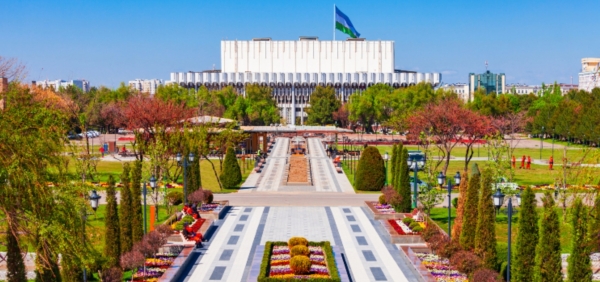Ambitious market reforms pay off in Uzbekistan says development bank
The European Bank for Reconstruction and Development (EBRD) has approved a new strategy for Uzbekistan, setting out its priorities in the country until 2029. The Bank reports that Central Asia’s most populous state has benefited from opening up its economy and ambitious market reforms. Strong economic growth has been largely uninterrupted, despite a global pandemic and the impact of the war in Ukraine, writes Political Editor Nick Powell.
Uzbekistan’s major economic advances since 2017 have clearly impressed the EBRD, which reports a rapid expansion in both agriculture and manufacturing and what it describes as robust infrastructure investment. A growing private sector and considerable progress with the country’s green agenda are also highlighted, especially what the Bank considers to be a remarkable expansion in renewable power generation.
Looking forward, the Bank’s strategic approach in Uzbekistan will be based on activities in three priority areas. The first will cover support decarbonisation, greater water efficiency and cleaner energy; the second developing the private sector and fostering employment, skills, inclusion and the digital transition; the third improving economic governance, the business climate and infrastructure connectivity.
Under the first priority, the EBRD will work with the authorities to further decarbonise the national economy and increase the share of renewable energy in the total power output. Special attention will be paid to the development and implementation of low-carbon pathways and the reduction of methane emissions under Uzbekistan’s Global Methane Pledge commitments. The EBRD will also support the commercialisation and modernisation of power distribution and transmission networks, and channel further funds into modernising and upgrading water, wastewater and irrigation facilities.
Under the second priority, the EBRD will expand its support to the country’s private sector by providing direct financing, credit lines to small and medium-sized enterprises, and risk-sharing through local partner banks and trade finance facilities to support increased energy efficiency and women- and youth-led enterprises. Domestic small businesses will continue to benefit from the EBRD’s Business Advisory Services programme. The Bank will also promote further digitalisation in the private sector, the expansion of e-commerce and the development of local capital markets.
Under the third priority, the EBRD will continue supporting the improved governance of state-owned enterprises and banks. It will support privatisation, including through pre-privatisation engagements; provide advice and financing to encourage the wider use of public-private partnerships; and support public-private sector dialogue through the Foreign Investors Council to help increase foreign direct investment. The Bank will continue working to enhance regional and global connectivity, including through policy engagements and financing to improve transport connectivity and regional power trading, and to help lower trade barriers.
Uzbekistan is the leading recipient of the EBRD funding in Central Asia for the fourth year running. To date, the Bank has invested around €4.28 billion in 147 projects across the country, most of which support private entrepreneurship and investment.
AdvertisementIt financed the construction of three greenfield solar power plants with total installed capacity of nearly 900 MW. The Bank also provided funds for the construction of a 100 MW wind power plant in the autonomous republic of Karakalpakstan, as well as a sovereign loan to modernise 118 pumping stations and improve the sustainability of water supply for irrigation in the densely populated Fergana Valley.
Samarkand became the first city in the country to join the EBRD’s Green Cities programme and is planning to deploy ecologically friendly electric buses. In the financial sector, the Bank works with local financial intermediaries to support SMEs and promote green lending. At the macro-economic level, the Bank also reports that Uzbekistan is seeing the benefits of trade liberalisation and substantially improved relations with neighbouring countries.
Share this article:






